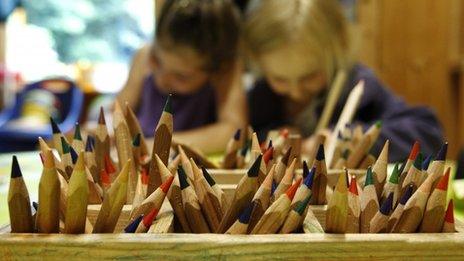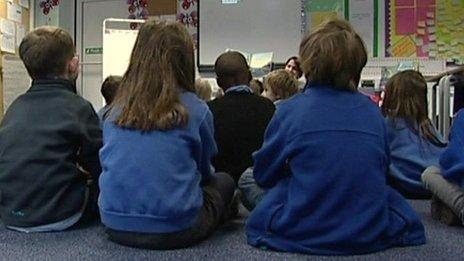Experts oppose assessments for four-year-olds
- Published

Lessons in Reception often involve play-based learning
Early years education experts and teachers are calling for plans for new baseline tests for four-year-olds in England's schools to be scrapped.
In an open letter, they warn they will be unreliable, harmful to children's wellbeing and learning, and disruptive in the crucial early days of Reception.
The Department for Education says the tests, to be introduced in September, are the best way to monitor progress.
But a government consultation found 57% of 1,063 respondents opposed them.
Although the tests are described as optional, many see it as inevitable schools will sign up to one of the six commercial provider programmes they will be invited to choose from.
There is likely to be pressure for head teachers to adopt an approved test so they have a record of Reception children's levels of attainment on entry to the school for when they take national tests at 11.
Announcing the tests last year, the then Education Secretary Michael Gove said children should be assessed when they entered primary school and again when they left at 11.
'Distraction'
Having a "baseline assessment" would enable the government to see which schools were making progress with disadvantaged children, he said.
But Beatrice Merrick, chief executive of the British Association for Early Childhood Education (Early Education), said they would not contribute to school accountability because they were not designed to predict educational progress.
They would be a "distraction" and would not help teachers "know their children better or plan for their learning", she added.
Child development and early years education expert Prof Cathy Nutbrown said the test would take teachers away from teaching and waste learning time.
"It is not in the interests of young children, whose learning and other developmental needs are better identified - over time - by well-qualified early years practitioners who observe and interact with young children as they play," she added.
Child's needs
Association of Teachers and Lecturers general secretary Dr Mary Bousted said: "All good teachers assess children as they begin in the Reception class, so they can support and challenge them in ways appropriate to their age and stage of development.
"The problem comes when the government turns assessment information into yet another way of measuring children, teachers and schools and finding them wanting.
"If baseline assessment is used to measure the effectiveness of pre-school provision, or if Ofsted expects to see baseline data used to demonstrate children's progress from year to year, then its primary purpose for teaching is immediately distorted."
A DfE spokesperson said: "As part of our plan for education, we want to see all children leaving primary school with a good standard of reading, writing and maths, and teachers agree that measuring progress is the best way to ensure primary schools are doing this.
"Most schools already do some form of assessment when children start in reception, so they already know what care and attention the child needs.
"Primary checks have not been introduced to track the progress of individual pupils - but to measure the starting point of them all."
- Published2 February 2014
